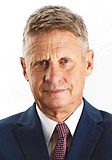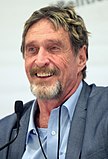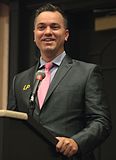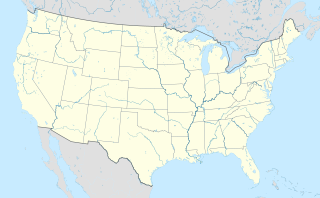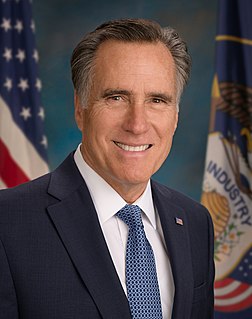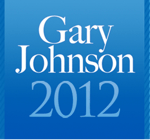| |||||||||||||||||||||||||||||
| |||||||||||||||||||||||||||||
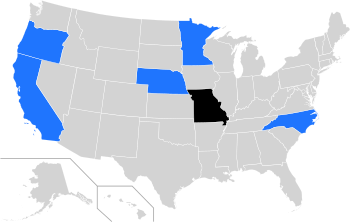 First place by first-instance vote
| |||||||||||||||||||||||||||||
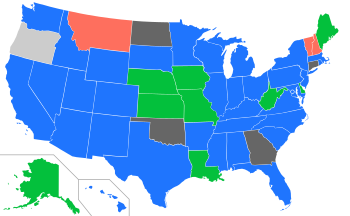 First place finishes by convention roll call
| |||||||||||||||||||||||||||||
| |||||||||||||||||||||||||||||
2016 U.S. presidential election |
|---|
| Republican Party |
| Democratic Party |
| Third parties |
| Related races |
| ||
|---|---|---|
Governor of New Mexico | ||
| ||
|---|---|---|
New York gubernatorial campaign U.S. Attorney for Massachusetts | ||
The 2016 Libertarian Party presidential primaries and caucuses allowed electors to indicate non-binding preferences for the Libertarian Party's presidential candidate. These differed from the Republican or Democratic presidential primaries and caucuses in that they did not appoint delegates to represent a candidate at the party's convention to select the party's nominee for the United States presidential election. The party's nominee for the 2016 presidential election was chosen directly by registered delegates at the 2016 Libertarian National Convention, which ran from May 26 to 30, 2016. The delegates nominated former New Mexico Governor Gary Johnson for President and former Massachusetts Governor Bill Weld for Vice President. [1]

The Libertarian Party (LP) is a political party in the United States that promotes civil liberties, non-interventionism, laissez-faire capitalism and shrinking the size and scope of government. The party was conceived at meetings in the home of David F. Nolan in Westminster, Colorado in 1971 and was officially formed on December 11, 1971 in Colorado Springs, Colorado. The founding of the party was prompted in part due to concerns about the Nixon administration, the Vietnam War, conscription and the end of the gold standard.

The president of the United States (POTUS) is the head of state and head of government of the United States of America. The president directs the executive branch of the federal government and is the commander-in-chief of the United States Armed Forces.

The Republican Party, also referred to as the GOP, is one of the two major political parties in the United States; the other is its historic rival, the Democratic Party.
Contents
- Candidates
- Timeline of the race
- Background
- January 2015 to January 2016: Early candidates
- April 2016: Top tier emerges
- Early May 2016: Ventura declines to run
- Late May 2016: Johnson consolidates support
- Polling
- National polling
- 2016 online polling
- Primaries and caucuses
- Minnesota caucuses
- Missouri primary
- North Carolina primary
- Nebraska primary
- Oregon primary
- California primary
- 2016 National Convention
- Endorsements
- Gary Johnson campaign
- John McAfee campaign
- Austin Petersen campaign
- Campaign finance
- Vice presidential primary
- See also
- References
Four primaries and one caucus were held. Missouri and North Carolina held primaries on March 15, as an alternative ballot to other primaries such as those of the Republicans and Democrats. Gary Johnson, who had won the party's nomination in the 2012 presidential election, won North Carolina with 42%. In Missouri a plurality of voters chose the "Uncommitted" option over local candidate Austin Petersen, 40% to 29%, with Johnson not appearing on the Missouri ballot due to announcing his candidacy after the filing deadline. An Oregon primary was run on May 27 during the national convention, while the California primary was held on June 7 after the party's convention. The only caucus was in Minnesota on March 1, where 75% of the electors selected Gary Johnson. Jurisdictions in the 2016 primaries that did not participate in conventional roll call are: American Samoa, Guam, Northern Mariana Islands, Oregon, Puerto Rico, and the U.S Virgin Islands.

Gary Earl Johnson is an American businessman, author, and politician who served as the 29th governor of New Mexico from 1995 to 2003 as a member of the Republican Party. He was the Libertarian Party nominee for President of the United States in the 2012 and 2016 elections. He was also the Libertarian nominee for U.S. Senate in the 2018 New Mexico senate election.
